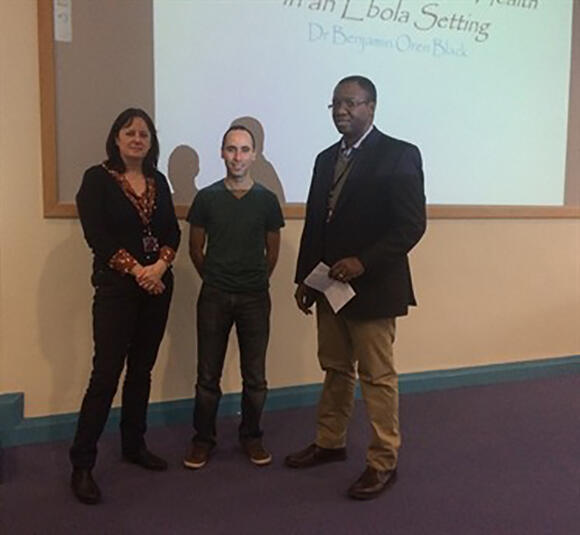
LSTM’s Seminar Series continued this week with a talk from Dr Benjamin Black, an obstetrics and gynaecology registrar working for Medecins San Frontiers (MSF) in Sierra Leone. His seminar, entitled: Sexual and Reproductive Health in an Ebola Setting, was introduced by Dr Charles Ameh, Deputy Head of LSTM’s Centre for Maternal and Newborn Health.
Dr Black began by explaining that the reason MSF was operating the maternity care referral centre was that even before Ebola Sierra Leone had some of the poorest maternity outcomes, with one in every 21 women dying in childbirth. Since Ebola every aspect of the service provided under sexual and reproductive health have been negatively affected.
Dr Black talked through the difficulties of treating women when Ebola was not at its current levels in Sierra Leone. The symptoms of many reversible or treatable obstetric emergencies, such as eclampsia, have similar symptoms to the early signs of Ebola. To safeguard staff, which had to be the priority in the centre, patients would be isolated if they presented with just three symptoms as listed on the triage form, filled in after a verbal history was taken. These questions related to miscarriage, temperature and contact with the sick as well as many more, but Dr Black said in time potential patients realised they would not be treated if they answered yes to some of these questions so they began to lie about where they were from, if they had cared for the sick or attended funerals. Once isolated the tests for the virus were slow so many women died while awaiting results and before care could be given.
He talked about the fact that once the triage forms could not be trusted all surgeries were carried out in Personal Protective Equipment or PPE, making each surgery far more dangerous to both the patient and the doctor. In August last year the centre had to be closed as the epidemic reached such proportions that it became unsafe for staff. Describing the state of maternity care in Sierra Leone going from bad to worse. Dr Black moved to the Ebola treatment centre near Bo.
He then went on to talk about how the virus affects the mother and the foetus through pregnancy. Previous outbreaks had shown that 100% of babies will die if their mother is infected during pregnancy, with many pregnancies ending in spontaneous miscarriage or still birth. Of the very few babies that have been born alive to infected mothers, all died within a few days of birth. Figures of previous outbreaks put the death rate of pregnant woman with Ebola at around 95%, and while Dr Black was keen to point out that there is no empirical evidence as yet, he felt the figures were much more hopeful in reality. He did however point out that if the woman recovers though she will no longer be infectious, it is unclear how long the products of her womb, (the amniotic fluid and the placenta) remain as a risk after the pregnancy is no longer viable. The priority has been to get these women to deliver their unborn babies as quickly as possible to ensure minimal risk to the women and the health workers.
Since the Ebola epidemic the number of women dying in childbirth has increased to one in every seven, making pregnancy in Sierra Leone a real risk to life. As such family planning has become an important role for health workers, ensuring that women leaving the centre and their families are aware of the risks of further pregnancies due to the lack of facilities. Contraception in the form of pills or implants are given at the centre and he explained that since all schools have been closed, family planning is vital to combat a potential rise in teenage pregnancies.
Dr Black concluded by asking the question What happens next? When the Ebola epidemic is over, and it will be, what will be left of maternity services and how can all of those involved work to get full services back?
CMNH has been working in Sierra Leone since 2009 with the Ministry of Health and Sanitation (MoHS) to improve maternal and newborn health services through the Making it Happen programme. In August 2014 during the height of the epidemic CMNH, in consultation with MoHS reluctantly took the decision to suspend its training programmes, though our in country team continued to work with MoHS to combat the epidemic and supply infection control supplies to the main maternity hospital. In February 2015 the improving picture of the epidemic means that CMNH are starting to work with MoHS to rebuild the maternity services.